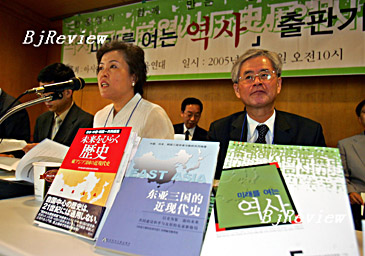
Scholars from China and Japan recently met for the second time in Tokyo under a joint history study program between the two countries. At the meeting, they discussed the research to be carried out, reaching a consensus on specific historical topics that they will study in the coming months. The Chinese and Japanese committees will conduct research on these topics and file reports independently. After that, they will compare notes and issue a joint report detailing their agreements and disagreements.
The scholars also set a timetable for the program. It was decided that they would meet for the third time in December to review each other's reports. The joint report is set to come out in June next year.
The meeting was held in a positive and constructive atmosphere. Scholars from the two countries gained a basic understanding of each other's views while stating their respective positions on some historical issues. Although they did not have time for an in-depth discussion, they took a substantial step and made a good start.
Reshaping regional relations
China-Japan relations have finally been stabilized after many dramatic twists and turns. Many insightful people have underlined the fragility of this relationship. The two countries' political leaders, commentators and media organizations are expected to take this into account and be careful about their words and deeds. As their different evaluations of history have triggered widespread concern, it is imperative that they face up to the problem and come up with a proper solution. That is largely why China and Japan initiated the joint history study program.
Some people have doubts about this program, regarding it as an impossible mission. I would like to make two issues clear to them: first, the standard by which we should judge the process and results of the joint history study, and second, how to define our dialogue partners.
The joint history study program has three dimensions. The first is to create a calm environment where each party can sort out its own views and listen to the opinions of the other party. The second is to probe into each other's views in discussions, during which they may exert an influence on each other. The third is to consider what the real differences are, what issues seem to be differences but actually are misunderstandings and in what areas consensus may be reached. At present, the first dimension has been realized, while the second and third dimensions will soon be put into practice.
Most Japanese people love peace and are critical of the aggressive war Japan waged against its neighbors. This is evident from the fact that the history textbook published by Fusosha Publishing Inc., which shows approval of Japan's aggression, is rarely adopted. These people are our major dialogue partners. However, as the war caused severe suffering to the Japanese people, most of them oppose the war in the belief that the Japanese were victims. We find that this position still falls short of the expectations of the victimized Asian nations.
It is a stark fact that Japan was an aggressor in the war. However, most Japanese are barely aware of this fact. Instead, they tend to associate the war with the atomic bombings of Hiroshima and Nagasaki and the air raids on Tokyo. These are also facts, but the point is how to analyze them. If they are told about the disasters Japan inflicted upon other Asian nations, the Japanese will easily understand why they suffered from the war.
| 